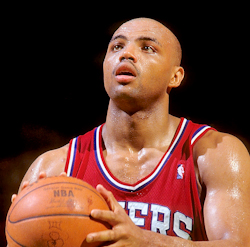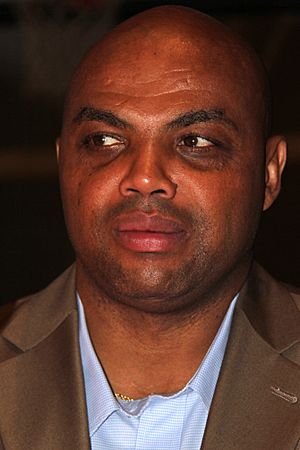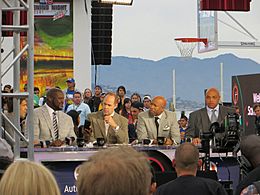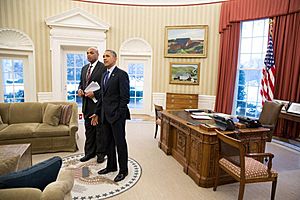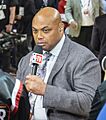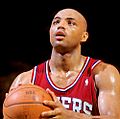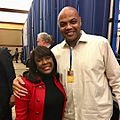Charles Barkley facts for kids
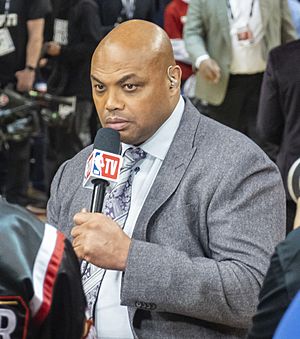
Barkley in 2019
|
|||||||||||||||||||||||
| Personal information | |||||||||||||||||||||||
|---|---|---|---|---|---|---|---|---|---|---|---|---|---|---|---|---|---|---|---|---|---|---|---|
| Born | February 20, 1963 Leeds, Alabama, U.S. |
||||||||||||||||||||||
| High school | Leeds (Leeds, Alabama) | ||||||||||||||||||||||
| Listed height | 6 ft 6 in (1.98 m) | ||||||||||||||||||||||
| Listed weight | 252 lb (114 kg) | ||||||||||||||||||||||
| Career information | |||||||||||||||||||||||
| College | Auburn (1981–1984) | ||||||||||||||||||||||
| NBA Draft | 1984 / Round: 1 / Pick: 5th overall | ||||||||||||||||||||||
| Selected by the Philadelphia 76ers | |||||||||||||||||||||||
| Pro career | 1984–2000 | ||||||||||||||||||||||
| Career history | |||||||||||||||||||||||
| 1984–1992 | Philadelphia 76ers | ||||||||||||||||||||||
| 1992–1996 | Phoenix Suns | ||||||||||||||||||||||
| 1996–2000 | Houston Rockets | ||||||||||||||||||||||
| Career highlights and awards | |||||||||||||||||||||||
|
|||||||||||||||||||||||
| Career NBA statistics | |||||||||||||||||||||||
| Points | 23,757 (22.1 ppg) | ||||||||||||||||||||||
| Rebounds | 12,546 (11.7 rpg) | ||||||||||||||||||||||
| Assists | 4,215 (3.9 apg) | ||||||||||||||||||||||
|
Medals
|
|||||||||||||||||||||||
Charles Wade Barkley (born February 20, 1963) is an American former professional basketball player. After his playing career, he became a television analyst for TNT and CBS Sports. People called him "Sir Charles", "the Bread Truck", and "the Round Mound of Rebound".
Barkley played 16 seasons in the National Basketball Association (NBA). Even though he was shorter than most power forwards, he used his strength to become one of the NBA's best rebounders and scorers. He was an 11-time NBA All-Star and was named the NBA Most Valuable Player (MVP) in 1993. He is also on the NBA's 50th and 75th anniversary teams.
Barkley was an All-American at Auburn University. The Philadelphia 76ers drafted him as the fifth pick in the 1984 NBA draft. In his first season, he was named to the All-Rookie First Team. He led the league in rebounding in the 1986–87 season. He was also the All-Star Game MVP in 1991. With the Phoenix Suns in 1993, he won the league's MVP award and led his team to the NBA Finals. He also won two gold medals with the U.S. national team at the 1992 and 1996 Olympic Games.
When Barkley retired in 2000, he was only the fourth player in NBA history to have 20,000 points, 10,000 rebounds, and 4,000 assists. He is in the Naismith Memorial Basketball Hall of Fame twice. First, in 2006 for his own career, and then in 2010 as a member of the 1992 Olympic "Dream Team".
Barkley was very popular with fans and the media. He was known for being outspoken. Since retiring, he has had a successful career as an NBA analyst on Inside the NBA. He has also written several books.
Contents
Early Life and High School Basketball
Barkley was born in Leeds, Alabama, a town near Birmingham. He grew up there. When he was young, his parents divorced. His stepfather passed away when Charles was 11 years old.
He went to Leeds High School. As a junior, he was about 5 feet 10 inches tall and weighed around 220 pounds. He didn't make the main basketball team that year. But during the summer, he grew to 6 feet 4 inches. This helped him earn a starting spot on the team in his senior year. He averaged 19.1 points and 17.9 rebounds per game. He led his team to a great 26–3 record and reached the state semi-finals.
Even with his improvements, college scouts didn't notice him much. That changed during the state high school semi-finals. He scored 26 points against a top player from Alabama. An assistant coach from Auburn University saw him play. He described Barkley as "a fat guy... who can play like the wind." Soon after, Barkley was recruited by Auburn. He studied business management while playing college basketball.
College Basketball Career
Barkley played collegiate basketball for the Auburn Tigers for three seasons. He was great at playing, even though he had trouble controlling his weight. He led the SEC in rebounding every year he played. Fans loved watching him. He would excite them with dunks and blocked shots. These moves were surprising for someone his height and weight.
It was common to see Barkley grab a rebound, then dribble the ball all the way down the court. He would then finish with a two-handed dunk. His size and skills earned him nicknames like "The Round Mound of Rebound."
During college, Barkley played center, even though he was shorter than most players in that position. He was officially listed as 6 feet 6 inches tall. He became part of Auburn's All-Century team. He still holds the Auburn record for career field goal percentage at 62.6%. He won many awards, including Southeastern Conference (SEC) Player of the Year in 1984. He was also selected for All-SEC teams three times.
In his three years at college, Barkley averaged 14.1 points, 9.6 rebounds, 1.6 assists, and 1.7 blocks per game. In 1984, he led the Tigers to their first ever NCAA tournament. Auburn retired his number 34 jersey on March 3, 2001.
Professional Basketball Career
Starting with the Philadelphia 76ers (1984–1992)
Barkley left Auburn early to join the 1984 NBA draft. The Philadelphia 76ers picked him fifth overall. He joined a team with famous players like Julius Erving and Moses Malone. These players had won the 1983 NBA championship. Malone helped Barkley learn how to manage his weight and prepare for games. Barkley often called Malone "Dad" because he was so important to his career.
In his first season, Barkley averaged 14.0 points and 8.6 rebounds per game. He was named to the All-Rookie Team. The 76ers made it to the Eastern Conference Finals but lost to the Boston Celtics.
In his second year, Barkley became the team's top rebounder and second-best scorer. He averaged 20.0 points and 12.8 rebounds per game. He helped the team reach the playoffs. He was named to the All-NBA Second Team.
Before the 1986–87 season, Moses Malone was traded. Barkley then became the team leader. He won his first and only rebounding title, averaging 14.6 rebounds per game. He also led the league in offensive rebounds. He averaged 23.0 points and earned his first trip to an NBA All-Star game.
The next season, Julius Erving retired. Barkley became the main player for the 76ers. He had his best season yet, averaging 28.3 points and 11.9 rebounds per game. He made his second All-Star Game and was named to the All-NBA First Team. For the first time in a while, the 76ers didn't make the playoffs.
In the 1988–89 season, Barkley continued to play well. He made his third straight All-Star Game and was named to the All-NBA First Team again. The 76ers lost in the first round of the playoffs.
During the 1989–90 season, Barkley finished second in MVP voting. He averaged 25.2 points and 11.5 rebounds per game. He was named to the All-NBA First Team for the third year in a row. He helped Philadelphia win 53 games, but they lost to the Chicago Bulls in the playoffs.
His great play continued into his seventh season. He averaged 27.6 points and 10.1 rebounds per game. His fifth All-Star Game was his best. He led the East team to a win with 17 points and 22 rebounds. He was named the All-Star Game MVP. At the end of the season, he was named to the All-NBA First Team for the fourth straight year.
The 1991–92 season was Barkley's last in Philadelphia. He wore number 32 instead of 34 to honor Magic Johnson. Johnson had announced he was HIV-positive. Barkley averaged 23.1 points and 11.1 rebounds per game. He made his sixth straight All-Star appearance. He ended his 76ers career as one of the team's top players in points, rebounds, and field-goal percentage.
Barkley wanted to leave Philadelphia because the team wasn't making the playoffs. On July 17, 1992, he was traded to the Phoenix Suns. During his time in Philadelphia, Barkley became very famous. He even had his own action figure and shoe line.
Playing for the Phoenix Suns (1992–1996)
The trade to Phoenix for the 1992–93 season was great for Barkley and the Suns. In his first game, he scored 37 points, grabbed 21 rebounds, and had 8 assists. He averaged 25.6 points, 12.2 rebounds, and a career-high 5.1 assists per game. He led the Suns to the best record in the NBA. For his amazing play, Barkley won the league's Most Valuable Player Award. He also played in his seventh straight All-Star Game. He led Phoenix to their first NBA Finals since 1976. Even though Barkley thought it was "destiny" for the Suns to win, they lost to the Chicago Bulls in six games.
Barkley had back pains, and he thought the 1993–94 season might be his last in Phoenix. Despite the pain, he started the season by winning the 1993 McDonald's Open in Germany and was named the MVP. In the NBA, he averaged 21.6 points and 11.2 rebounds per game. He was chosen for his eighth All-Star Game but couldn't play due to an injury. The Suns still had a good record and made it to the Western Conference Semifinals. They lost to the Houston Rockets. In one playoff game, Barkley scored 56 points, which was one of the highest totals ever in a playoff game at that time.
After thinking about retiring, Barkley returned for his eleventh season. He continued to deal with injuries. He averaged 23 points and 11.1 rebounds per game. The Suns had a 59–23 record. In the playoffs, the Suns lost to the Houston Rockets again, even after having a big lead in the series.
The 1995–96 season was Barkley's last with the Phoenix Suns. He led the team in scoring, rebounds, and steals. He averaged 23.3 points and 11.6 rebounds. He made his tenth All-Star Game appearance. He also became only the tenth player in NBA history to reach 20,000 points and 10,000 rebounds in his career. After the Suns lost in the first round of the playoffs, Barkley was traded to Houston. During his time with the Suns, Barkley was an All-NBA and All-Star player in all four seasons.
Joining the Houston Rockets (1996–2000)
Being traded to the Houston Rockets for the 1996–97 season was Barkley's last chance to win an NBA championship. He joined a team with two other great players, Hakeem Olajuwon and Clyde Drexler. Barkley had some injuries during the season and only played 53 games. He became the team's second-leading scorer, averaging 19.2 points. He focused on rebounding, averaging 13.5 per game, which was his second-best career average. The Rockets made it to the Western Conference Finals but lost to the Utah Jazz.
The 1997–98 season was another year with injuries for Barkley. He averaged 15.2 points and 11.7 rebounds per game. The Rockets lost in the first round of the playoffs to the Utah Jazz. During the lockout-shortened season, Barkley played 42 games. He averaged 16.1 points and 12.3 rebounds per game. He became only the second player in NBA history, after Wilt Chamberlain, to get 23,000 points, 12,000 rebounds, and 4,000 assists. The Rockets made the playoffs but lost in the first round to the Los Angeles Lakers.
The 1999–2000 season was Barkley's final year in the NBA. His season and career seemed to end early when he injured his left leg in December 1999. But Barkley didn't want his career to end with an injury. After four months, he returned for one last game on April 19, 2000. In a home game against the Vancouver Grizzlies, Barkley scored a memorable basket. He grabbed an offensive rebound and put the ball back in, which was a common move for him. He achieved his goal of walking off the court on his own, to a standing ovation. After that basket, Barkley immediately retired, ending his sixteen-year Hall of Fame career.
Olympic Games
Barkley played in the 1992 and 1996 Olympic Games. He won two gold medals as a member of the United States men's basketball team. In 1992, international rules changed, allowing NBA players to play in the Olympics for the first time. This team was called the "Dream Team". They won all their games and averaged an Olympic record 117.3 points per game. Barkley led the team in scoring with 18.0 points per game. He also set an Olympic single-game scoring record with 30 points against Brazil.
At the 1996 Atlanta Summer Olympic Games, Barkley again led the team in scoring, rebounds, and field goal percentage. He averaged 12.4 points and 6.6 rebounds per game. The team had a perfect 8–0 record and won another gold medal.
Player Profile
Barkley mostly played the power forward position. Sometimes he played small forward or center. He was known for his unique body type for a basketball player. He was stockier than most small forwards and shorter than most power forwards. But Barkley could still outplay taller and faster opponents. He did this because of his amazing strength and quickness.
Barkley was a great scorer, averaging 22.1 points per game in his career. He was very good at scoring efficiently. He led the NBA in 2-point field goal percentage for several seasons. He was one of the NBA's most versatile players. He could score from anywhere on the court. He was also known for being a clutch player, performing well in important moments.
Barkley is the shortest player in NBA history to lead the league in rebounding. He averaged a career-high 14.6 rebounds per game in the 1986–87 season. His strong and aggressive style of play, combined with his size, made him one of the greatest rebounders ever. He averaged 11.7 rebounds per game in his career. He was famous for grabbing a defensive rebound, dribbling the length of the court, and finishing with a powerful dunk.
Barkley also had good defensive skills. He was quick and could read the game well to get steals. He is among the all-time leaders in steals for power forwards. Even though he was undersized, he also had many blocked shots. His speed and jumping ability allowed him to chase down and block shots from faster players.
SLAM magazine ranked Barkley among the top 20 players of all time. NBA Hall-of-Famer Bill Walton said Barkley was like Magic and Larry because he didn't just play one position. Walton said, "He plays everything; he plays basketball. There is nobody who does what Barkley does."
Legacy
During his 16 years in the NBA, Barkley was known as one of the most outspoken and dominant players. His impact on basketball went beyond his rebounding, assists, scoring, and physical play. He was known for speaking his mind.
Barkley was a regular All-Star player. He won the league MVP award in 1993. His physical style of play earned him nicknames like "Sir Charles" and "The Round Mound of Rebound." He was named to the All-NBA team eleven times. He won two gold medals with the United States Olympic Basketball team. He led both the 1992 "Dream Team" and the 1996 Men's Basketball team to perfect records.
He retired as one of only four players in NBA history to have at least 20,000 points, 10,000 rebounds, and 4,000 assists. As of 2023, he has the 12th highest Player Efficiency Rating (PER) in NBA history.
In 1996, Barkley was honored as one of the 50 greatest players of all time. Auburn University retired his number 34 jersey on March 3, 2001. The Philadelphia 76ers also retired his number 34 jersey that same month. On March 20, 2004, the Phoenix Suns honored Barkley by adding him to the "Suns Ring of Honor". For his achievements, Barkley was inducted into the Naismith Memorial Basketball Hall of Fame in 2006. In October 2021, he was named to the NBA's 75th Anniversary Team.
NBA Career Statistics
| Legend | |||||
|---|---|---|---|---|---|
| GP | Games played | GS | Games started | MPG | Minutes per game |
| FG% | Field goal percentage | 3P% | 3-point field goal percentage | FT% | Free throw percentage |
| RPG | Rebounds per game | APG | Assists per game | SPG | Steals per game |
| BPG | Blocks per game | PPG | Points per game | Bold | Career high |
Regular Season Stats
| Year | Team | GP | GS | MPG | FG% | 3P% | FT% | RPG | APG | SPG | BPG | PPG |
|---|---|---|---|---|---|---|---|---|---|---|---|---|
| 1984–85 | Philadelphia | 82 | 60 | 28.6 | .545 | .167 | .733 | 8.6 | 1.9 | 1.2 | 1.0 | 14.0 |
| 1985–86 | Philadelphia | 80 | 80 | 36.9 | .572 | .227 | .685 | 12.8 | 3.9 | 2.2 | 1.6 | 20.0 |
| 1986–87 | Philadelphia | 68 | 62 | 40.3 | .594 | .202 | .761 | 14.6* | 4.9 | 1.8 | 1.5 | 23.0 |
| 1987–88 | Philadelphia | 80 | 80 | 39.6 | .587 | .280 | .751 | 11.9 | 3.2 | 1.3 | 1.3 | 28.3 |
| 1988–89 | Philadelphia | 79 | 79 | 39.1 | .579 | .216 | .753 | 12.5 | 4.1 | 1.6 | .9 | 25.8 |
| 1989–90 | Philadelphia | 79 | 79 | 39.1 | .600 | .217 | .749 | 11.5 | 3.9 | 1.9 | .6 | 25.2 |
| 1990–91 | Philadelphia | 67 | 67 | 37.3 | .570 | .284 | .722 | 10.1 | 4.2 | 1.6 | .5 | 27.6 |
| 1991–92 | Philadelphia | 75 | 75 | 38.4 | .552 | .234 | .695 | 11.1 | 4.1 | 1.8 | .6 | 23.1 |
| 1992–93 | Phoenix | 76 | 76 | 37.6 | .520 | .305 | .765 | 12.2 | 5.1 | 1.6 | 1.0 | 25.6 |
| 1993–94 | Phoenix | 65 | 65 | 35.4 | .495 | .270 | .704 | 11.2 | 4.6 | 1.6 | .6 | 21.6 |
| 1994–95 | Phoenix | 68 | 68 | 35.0 | .486 | .338 | .748 | 11.1 | 4.1 | 1.6 | .7 | 23.0 |
| 1995–96 | Phoenix | 71 | 71 | 37.1 | .500 | .280 | .777 | 11.6 | 3.7 | 1.6 | .8 | 23.2 |
| 1996–97 | Houston | 53 | 53 | 37.9 | .484 | .283 | .694 | 13.5 | 4.7 | 1.3 | .5 | 19.2 |
| 1997–98 | Houston | 68 | 41 | 33.0 | .485 | .214 | .746 | 11.7 | 3.2 | 1.0 | .4 | 15.2 |
| 1998–99 | Houston | 42 | 40 | 36.3 | .478 | .160 | .719 | 12.3 | 4.6 | 1.0 | .3 | 16.1 |
| 1999–00 | Houston | 20 | 18 | 31.0 | .477 | .231 | .645 | 10.5 | 3.2 | .7 | .2 | 14.5 |
| Career | 1,073 | 1,012 | 36.7 | .541 | .266 | .735 | 11.7 | 3.9 | 1.5 | .8 | 22.1 | |
| All-Star | 11 | 7 | 23.2 | .495 | .250 | .625 | 6.7 | 1.8 | 1.3 | .4 | 12.6 | |
Playoff Stats
| Year | Team | GP | GS | MPG | FG% | 3P% | FT% | RPG | APG | SPG | BPG | PPG |
|---|---|---|---|---|---|---|---|---|---|---|---|---|
| 1985 | Philadelphia | 13 | 2 | 31.4 | .540 | .667 | .733 | 11.1 | 2.0 | 1.8 | 1.2 | 14.9 |
| 1986 | Philadelphia | 12 | 12 | 41.4 | .578 | .067 | .695 | 15.8 | 5.6 | 2.3 | 1.3 | 25.0 |
| 1987 | Philadelphia | 5 | 5 | 42.0 | .573 | .125 | .800 | 12.6 | 2.4 | .8 | 1.6 | 24.6 |
| 1989 | Philadelphia | 3 | 3 | 45.0 | .644 | .200 | .710 | 11.7 | 5.3 | 1.7 | .7 | 27.0 |
| 1990 | Philadelphia | 10 | 10 | 41.9 | .543 | .333 | .602 | 15.5 | 4.3 | .8 | .7 | 24.7 |
| 1991 | Philadelphia | 8 | 8 | 40.8 | .592 | .100 | .653 | 10.5 | 6.0 | 1.9 | .4 | 24.9 |
| 1993 | Phoenix | 24 | 24 | 42.8 | .477 | .222 | .771 | 13.6 | 4.3 | 1.6 | 1.0 | 26.6 |
| 1994 | Phoenix | 10 | 10 | 42.5 | .509 | .350 | .764 | 13.0 | 4.8 | 2.5 | .9 | 27.6 |
| 1995 | Phoenix | 10 | 10 | 39.0 | .500 | .257 | .733 | 13.4 | 3.2 | 1.3 | 1.1 | 25.7 |
| 1996 | Phoenix | 4 | 4 | 41.0 | .443 | .250 | .787 | 13.5 | 3.8 | 1.0 | 1.0 | 25.5 |
| 1997 | Houston | 16 | 16 | 37.8 | .434 | .289 | .769 | 12.0 | 3.4 | 1.2 | .4 | 17.9 |
| 1998 | Houston | 4 | 0 | 21.8 | .522 | .000 | .571 | 5.3 | 1.0 | 1.3 | .0 | 9.0 |
| 1999 | Houston | 4 | 4 | 39.3 | .529 | .286 | .667 | 13.8 | 3.8 | 1.5 | .5 | 23.5 |
| Career | 123 | 108 | 39.4 | .513 | .255 | .717 | 12.9 | 3.9 | 1.6 | .9 | 23.0 | |
NBA Records
Regular Season Records
- Most offensive rebounds in a half: 13, against the New York Knicks, March 4, 1987.
- Most offensive rebounds in a quarter: 11, against the New York Knicks, March 4, 1987. (Tied with Larry Smith)
- Shortest player to lead the league in rebounds: at 6’6".
Playoff Records
- Most free throws made in a half: 19, against the Seattle SuperSonics, June 5, 1993.
- Most free throw attempts in a 7-game series: 100, against the Milwaukee Bucks, 1986 Eastern Conference Semi-finals.
- Most turnovers in a 7-game series: 37, against the Milwaukee Bucks, 1986 Eastern Conference Semi-finals.
Television Career
Sports Analyst Role
Since 2000, Barkley has been a studio analyst for Turner Network Television (TNT). He appears on their NBA coverage before games and at halftime. He also works on special NBA events. He is part of the show Inside the NBA. On this show, Barkley, Ernie Johnson Jr., Kenny Smith, and Shaquille O'Neal talk about NBA games and other basketball topics. Barkley has won five Sports Emmy Awards for his work on TNT.
Barkley once challenged NBA official Dick Bavetta to a race for charity. The race happened at the 2007 NBA All-Star Weekend. Barkley won the race, and money was donated to charity.
Since 2011, Barkley has also been an analyst for the NCAA Division I men's basketball tournament. This is a joint coverage between Turner Sports and CBS. He has broadcast every Final Four since 2011. In October 2022, Barkley signed a long contract to stay with TNT Sports.
Other TV Shows
From 2002 to 2003, Barkley hosted a talk show on TNT called Listen Up! Charles Barkley with Ernie Johnson. In 2017, he hosted a show called American Race on TNT. In the fall of 2023, Barkley co-hosted a news discussion show called King Charles with Gayle King on CNN.
He played himself in the 1996 movie Space Jam. He also appeared in TV shows like Suits and Modern Family. He has voiced animated versions of himself in Clerks: The Animated Series and We Bare Bears. Barkley has hosted Saturday Night Live four times.
Personal Life
Family Life
Barkley and Maureen Blumhardt met in the 1980s. They got married in 1989. They live in Scottsdale, Arizona. Their daughter, Christiana, was born in 1989. She is married and has two children.
Golf Hobby
Barkley started playing golf during his NBA career. He continued playing after he retired. It was a way for him to stay competitive. He often plays in the American Century Championship tournament. He has worked to improve his golf swing over time.
Political Views
Barkley has spoken about his political views over the years. He once said he was a Republican but later changed his mind. He has said he is an Independent. He believes that both major political parties have issues.
He supports LGBT rights. He has said that people should not judge others. He believes in equality for everyone. Barkley has also spoken about the importance of education and stopping crime in communities. He has encouraged people to focus on these important issues.
Books Written
In 1991, Barkley worked with sportswriter Roy S. Johnson on his autobiography, Outrageous. In 2002, Barkley released the book I May Be Wrong, But I Doubt It. This book included comments from his friend Michael Wilbon. Three years later, Barkley released Who's Afraid of a Large Black Man?. This book is a collection of interviews with famous people from different fields.
Images for kids
See also
 In Spanish: Charles Barkley para niños
In Spanish: Charles Barkley para niños
 | Percy Lavon Julian |
 | Katherine Johnson |
 | George Washington Carver |
 | Annie Easley |


